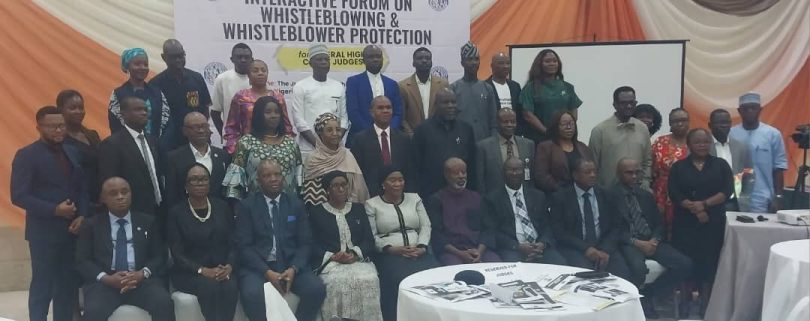Anti-corruption advocates, civil society organisations and legal experts have called for whistleblower protection law to empower citizens and public servants in their fight against corruption.
By Angela Atabo
Anti-corruption advocates, civil society organisations and legal experts have called for whistleblower protection law to empower citizens and public servants in their fight against corruption.
They said that stronger legal safeguards were imperative to the fight against corruption in Nigeria.
They made the call at the First National Interactive Forum on Whistleblowing and Whistleblower Protection for Federal High Court Judges in Abuja on Thursday.
The forum, which has its theme “The Judiciary and Whistleblower Protection in Nigeria: Challenges and Responsibilities”, was organised by the African Centre for Media and Information Literacy (AFRICMIL)in partnership with Tap iNitiative,CeFTPI,PRIMORG and Natiomal Human Rights Commission.
The News Agency of Nigeria (NAN) recalls that the Whistleblowing Policy in Nigeria, an anti-corruption programme that encourages people to voluntarily disclose information about corruption was introduced in 2016.
However, there is no legal framework for whistleblowers protection,thus making them prone to victimisation among other things.
Speaking on the role of the judiciary, the Chief Judge of the Federal High Court of Nigeria, Justice John Tsoho, described judges as the final bastion of justice.
Tsoho, who was represented by Justice Dorcas Agishi, said without proper protection, whistleblowers are forced into silence and when that happens, a powerful tool against corruption is lost.
“This undermines the very foundation of our legal system and our efforts to build a just and transparent society.
“As judges, we have a profound responsibility to ensure that our courts are safe or safe refuge for whistleblowers.”
Tsoho urged the High Court judges to explore international best practices to achieve a unique legal landscape.
“By upholding the rights of whistleblowers, we are not just protecting individuals, we are strengthening our nation’s integrity and fostering a culture of accountability,” he said
Dr Chido Onumah, Coordinator of AFRICMIL, said the Centre through its anti-corruption and good governance project, Corruption Anonymous (CORA), had been supporting whistleblowers, advocating legal reform among others.
Onumah said in doing that AFRICMIL has seen the deep cracks in the system and the most urgent issue is the safety of whistleblowers.
“In Nigeria, it is not corruption that silences most people. It is the fear that nothing will be done if they report. Or worse, that something harmful will be inflicted on them for daring to speak up.
“Whistleblowers often face severe risks, including harassment, intimidation, and job loss.
“The absence of comprehensive whistleblower protection laws in Nigeria and many West African countries exacerbate these risks.
“Without any shred of doubt, judges are the most important stakeholders in safeguarding whistleblowing and whistleblowers.”
Onumah said the interactive with judges therefore, sought to address the gap by providing an opportunity for judges to interface with other stakeholders in the whistleblowing ecosystem and identify the challenges of the judiciary in whistleblower protection.
Anthony Ojukwu, the Executive Secretary of the National Human Rights Commission (NHRC), urged the National Assembly to treat the whistleblowers protection bill as a legislative emergency.
According to him, the National Assembly should pass it, and ensure it has clear protection mechanisms and adequate funding for implementation.
Ojukwu, who was represented by Harry Obe, Director, Economic, Social and Cultural Rights, NHRC, appealed to the judiciary for progressive adjudication and the interpretation of existing laws in the spirit of promoting transparency and protecting defendants and expedite hearings.
The NHRC executive secretary also called for punitive measures against retaliators to serve as a star warning to other would-be retaliators, canvasing for protection of anonymity.
“Let us see whistleblowers not as snitches but as heroes defending our commonwealth and our rights,” he said.
The Executive Director of PRIMORG, Augustine Agbonsuremi, appealed to judges to contribute towards having a law that would assist in whistleblowing cases.
“If there is no law to rely on, what do you do? But even when there is no law, we recommend that there are some discretionary powers of exercise.”(NAN)

